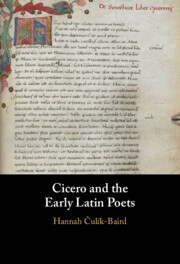Book contents
- Cicero and the Early Latin Poets
- Cicero and the Early Latin Poets
- Copyright page
- Epigraph
- Dedication
- Contents
- Acknowledgements
- Note on Editions of Fragments
- Texts and Abbreviations
- Introduction “All Minds Quote”
- Chapter 1 Cicero and the Poets
- Chapter 2 Poetic Citation by Ciceronian Genre
- Chapter 3 Roman Comedy and Scholarship
- Chapter 4 Singing in Cicero
- Chapter 5 Poetry as Artefact
- Envoi
- Note to Appendices
- Bibliography
- Index of Passages Discussed
- General Index
Chapter 4 - Singing in Cicero
Published online by Cambridge University Press: 21 April 2022
- Cicero and the Early Latin Poets
- Cicero and the Early Latin Poets
- Copyright page
- Epigraph
- Dedication
- Contents
- Acknowledgements
- Note on Editions of Fragments
- Texts and Abbreviations
- Introduction “All Minds Quote”
- Chapter 1 Cicero and the Poets
- Chapter 2 Poetic Citation by Ciceronian Genre
- Chapter 3 Roman Comedy and Scholarship
- Chapter 4 Singing in Cicero
- Chapter 5 Poetry as Artefact
- Envoi
- Note to Appendices
- Bibliography
- Index of Passages Discussed
- General Index
Summary
Discussion of Cicero’s quotation of lyrics from Roman tragedy - particularly Accius’ Philocteta and Ennius’ Andromacha - in the Tusculan Disputations as part of philosophical argument against the vocalization of pain. Discussion of Cicero’s understanding of the musicality, melody, and pitch of Roman tragic song, and the use of song as part of philosophical argumentation.
- Type
- Chapter
- Information
- Cicero and the Early Latin Poets , pp. 173 - 196Publisher: Cambridge University PressPrint publication year: 2022

